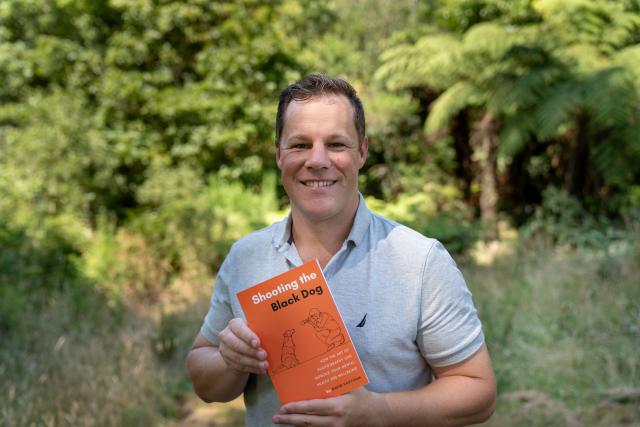
By Gabriella Vukman
In efforts to tackle mental health head-on, local photographer and now author David Eastham has undertaken the task of writing and publishing a book on mental health strategies.
Based on his own experience coping with mental breakdowns, David hopes his book will help people who are struggling as well as provide tips for and raise awareness around preventative measures for mental breakdowns.
The book, currently available for purchase, is called ‘Shooting the Black Dog’ and reveals how David overcame his own mental health struggles through animal photography..
“Going back a number of years I had a pretty significant mental health breakdown and I went down the typical medication and psychologist route,” David said.
“Whilst these traditional measures got me back functioning, I still didn’t feel like myself.
“I started doing a bit of research and saw that getting a hobby and involving a bit of creativity into your life can help with your mental health.”
Turning to photography as his therapeutic and creative outlet, David discovered a tool he could turn to in order to battle mental health flare ups.
“I went and bought a camera and had actually never done photography before,” David said.
“I found that photography was my silver bullet for mental health and then, coming from a science background, I went ‘okay, why is this the case and why is it that photography is so good for my mental health and well-being?’”
Sparked by intrigue, David began researching creativity and its connection to mental health.
“I was going to write a blog or an article, and then it just got bigger and bigger,” David said.
“I thought’ hang on,’ why don’t I turn this into a book and that was about four years ago.”
David is scheduling his book launch event along with the release of a program that is also tailored towards beating mental health issues, for late March.
Whilst David’s book began as a research undertaking, it also depicts his experience with mental health.
“I started mentioning why creativity and specifically photography was so good for my mental health, and then when I decided to actually turn it into a book, I thought, ‘well the first chapter really needs to be about my own experience, what I went through and my story.’
“After that I brainstormed what chapters people would benefit from.”
For David, breaking down the stigma surrounding mental health involves being able to talk freely about it.
”The biggest misconception surrounding mental health is that people think that they are immune to it,” he said.
“I was the exact same, I thought that I was immune to it and I’d seen other people around me battle depression and anxiety and I just thought that I would never get it but my mental breakdown absolutely changed my life.
“For me, what we should be aiming for is being able to talk about our mental health like we talk about any other injury.”
Mental illness prevention is another of David’s priorities and preventative tips are also featured in ‘Shooting the Black Dog’.
“One of the biggest issues is that we’re trying to deal with the problem a bit downstream, but if you were to try and go to your doctor or ring up to see a psychologist, the wait times are astronomical, the cost to actually see someone is off the charts with the cost of living at the moment,” he said.
“We need to try and treat the problem upstream, before people have a breakdown and before people get to the stage where they have to meet and see a psychologist and get on medication and so on.
“Whilst people do still need to access medication etc, there is much more work we can do in the preventative space.”
For David, preventing people from having a breakdown rather than “throwing resources” at people once they have already had an episode is the way to go.
“Each person will experience the warning signs of a mental breakdown quite differently,” he said.
“For me, I start to sleep intermittently, my energy levels are low and I get irritated very easily.”
“One of my final mental breakdown indicators is getting pins and needles all over my back.”
David’s book highlights the typical symptoms that people will have and also outlines the need for each individual to realise their own symptoms early and be attuned to them.
The book covers not only David’s mental breakdown experience but also delves into the science behind therapeutic photography and the role of creativity.
There are over 20 exercises in the book compiled by David through not just research, but word of mouth and trial and error.
“A whole range of exercises where you might read the book and find five that work for you and the other fifteen don’t which is absolutely fine,” David said.
“Everyone can grab a few takeaways out of it, to me it’s just like having more tools in the toolbox to battle depression, anxiety and benefit our mental health.”
Writing about his experience, though a little challenging, was therapeutic for David.
“I found that the actual process of writing, whilst divulging my own breakdown and experiences with mental health was quite tough and confronting at times, it was also therapeutic at the same time.
“I’ve had some people ask if I will write another book at some stage and I think that I definitely will.”
Whilst David admits that different tools work for different people and that photography might not be everyone’s “silver bullet”, he emphasised the importance and functionality of creative outlets when combating mental health issues.
“For me, if it resonates for even a few people to pick up the book and read it, to me that is success.
“As much as photography is my silver bullet and may not be for everyone, it’s all about getting another tool in the toolbox to help people with their own mental health journeys.”






